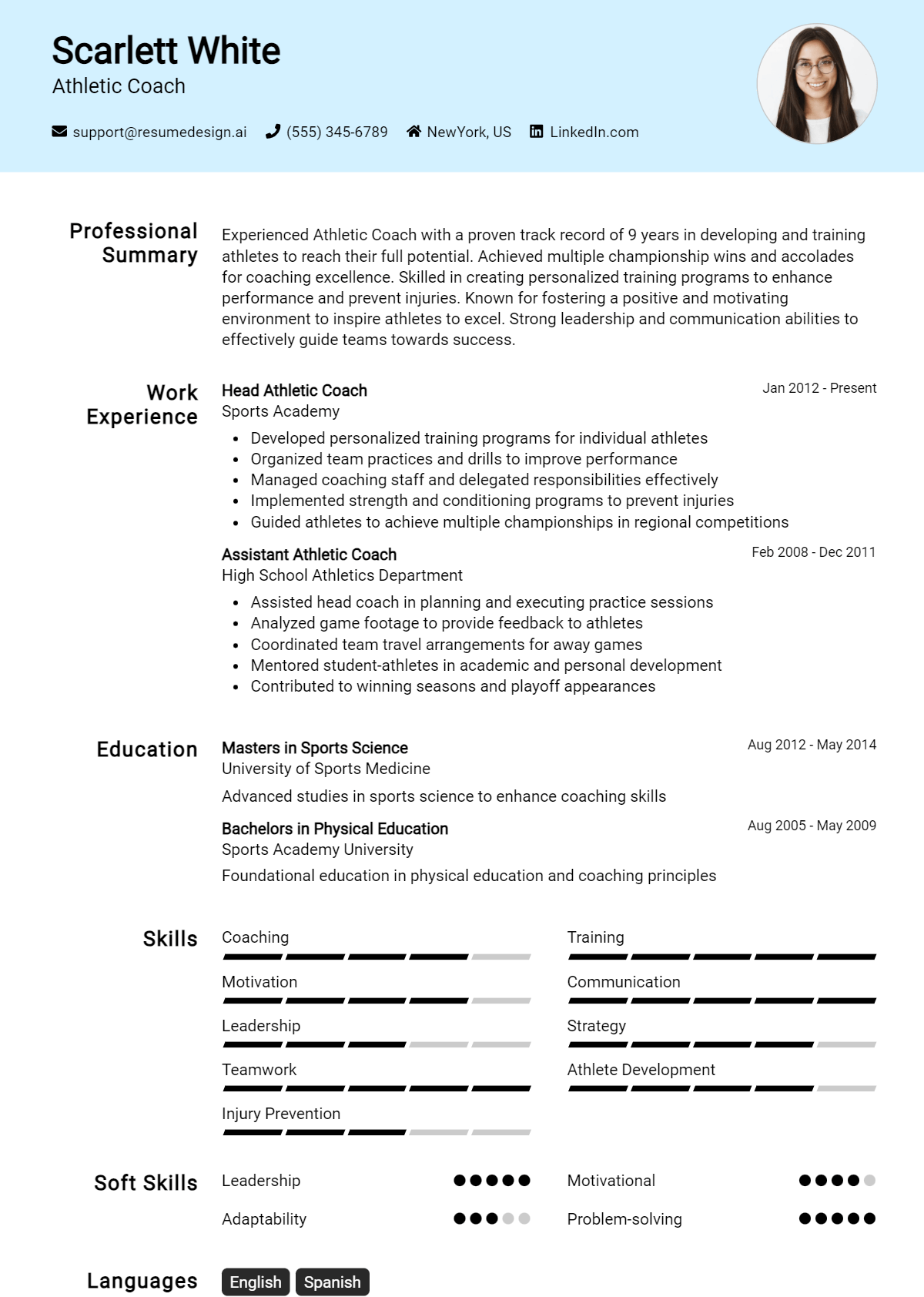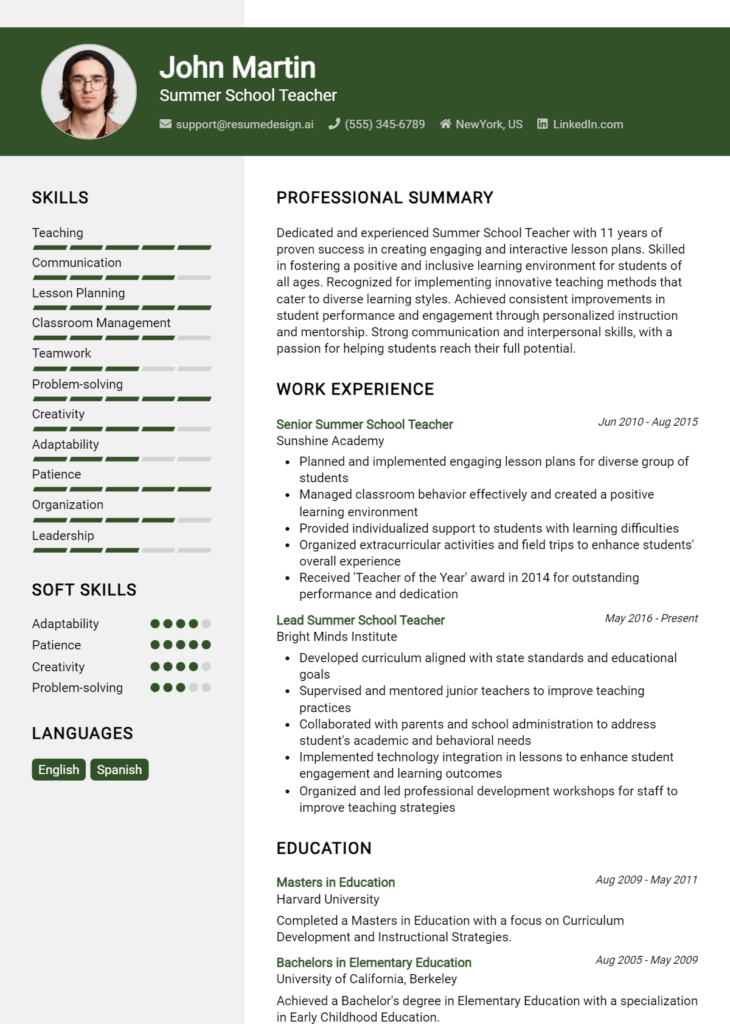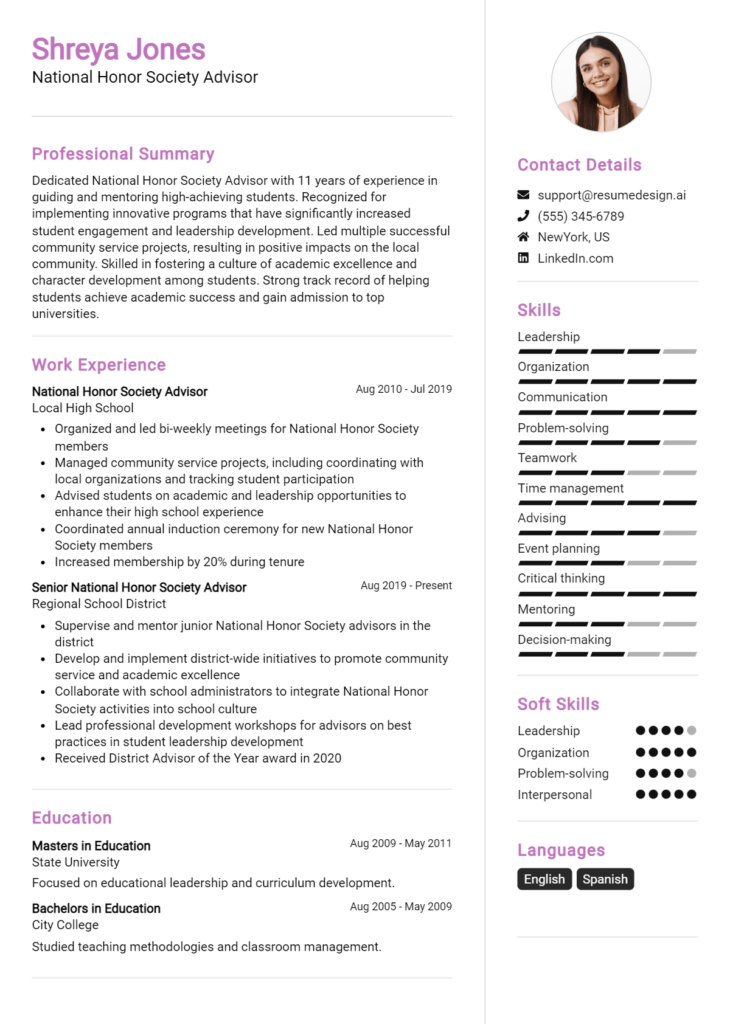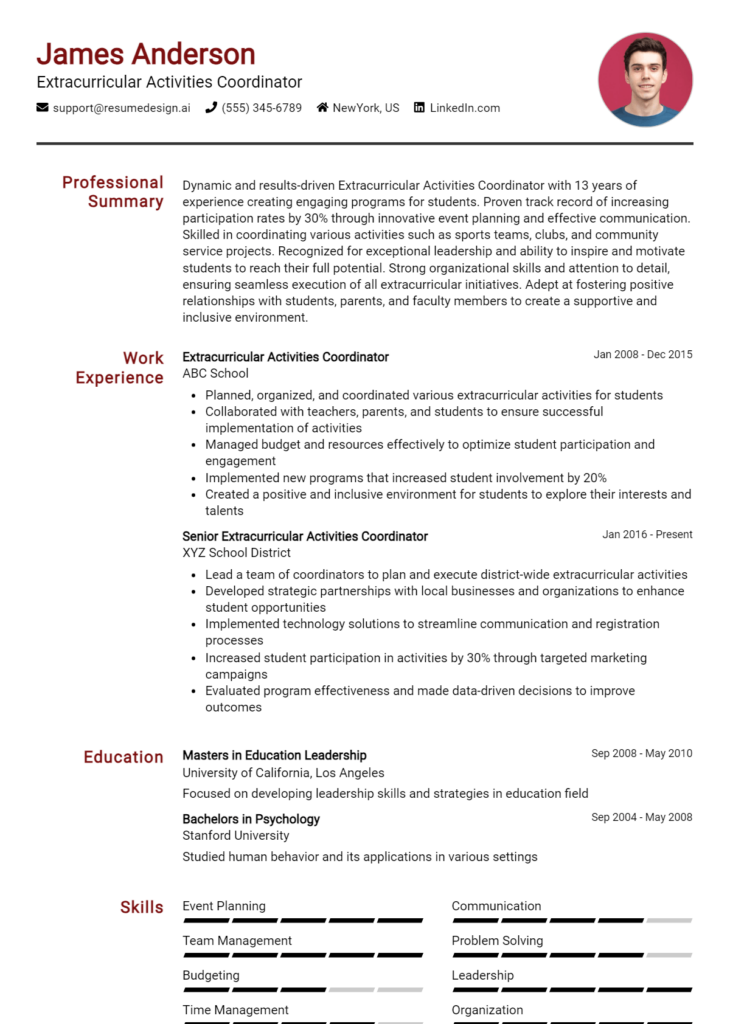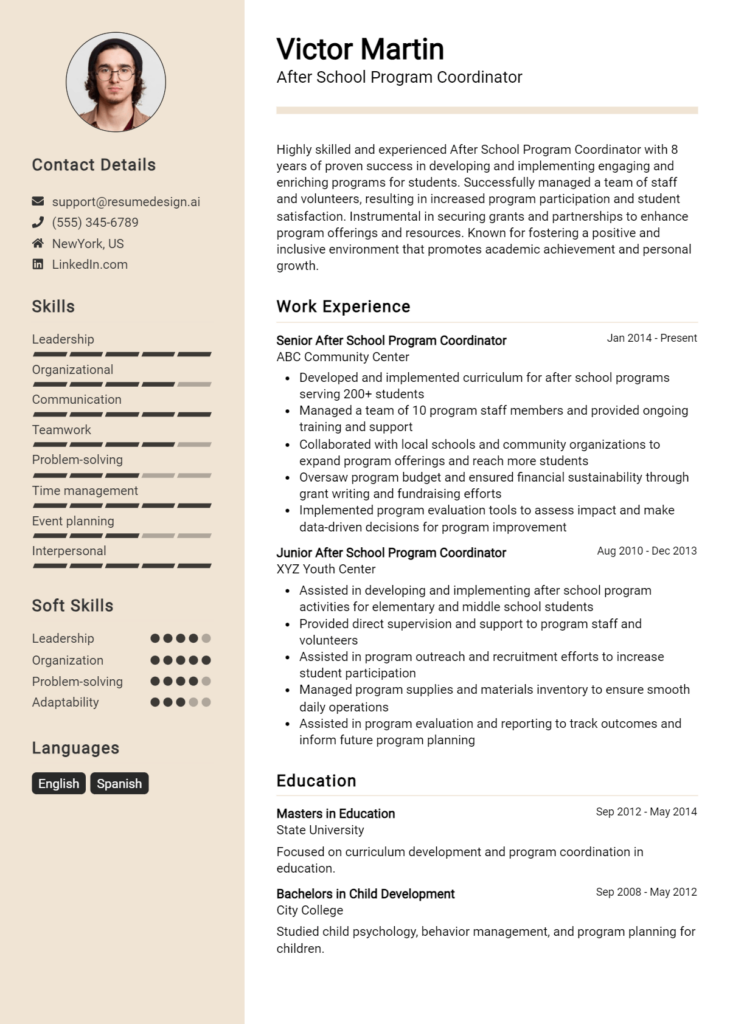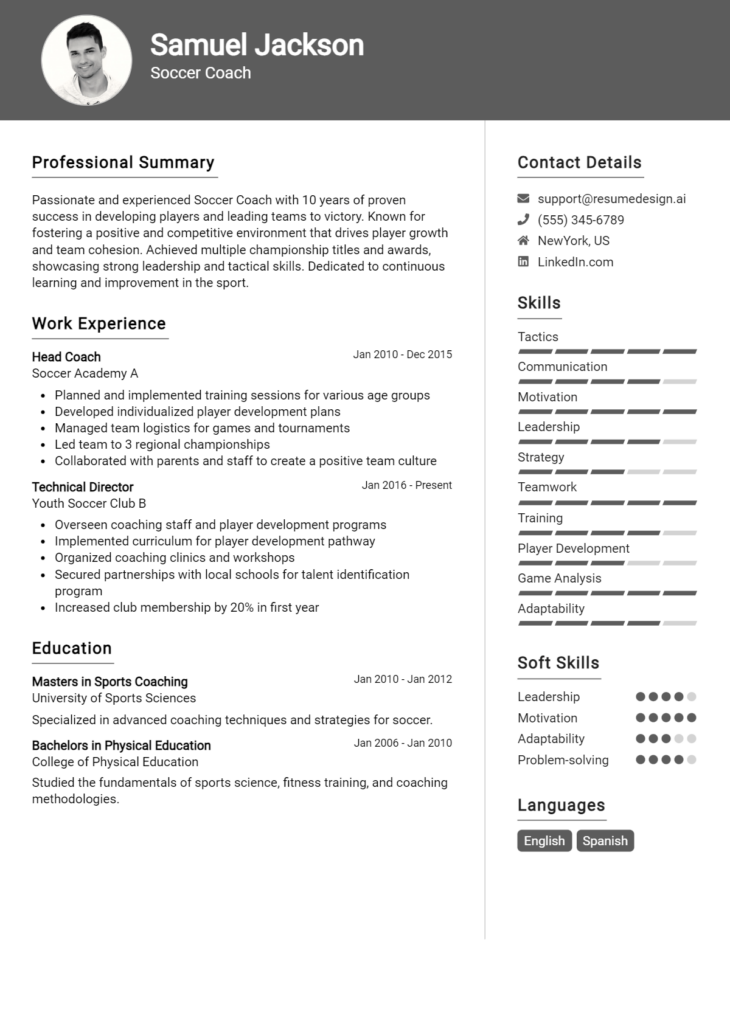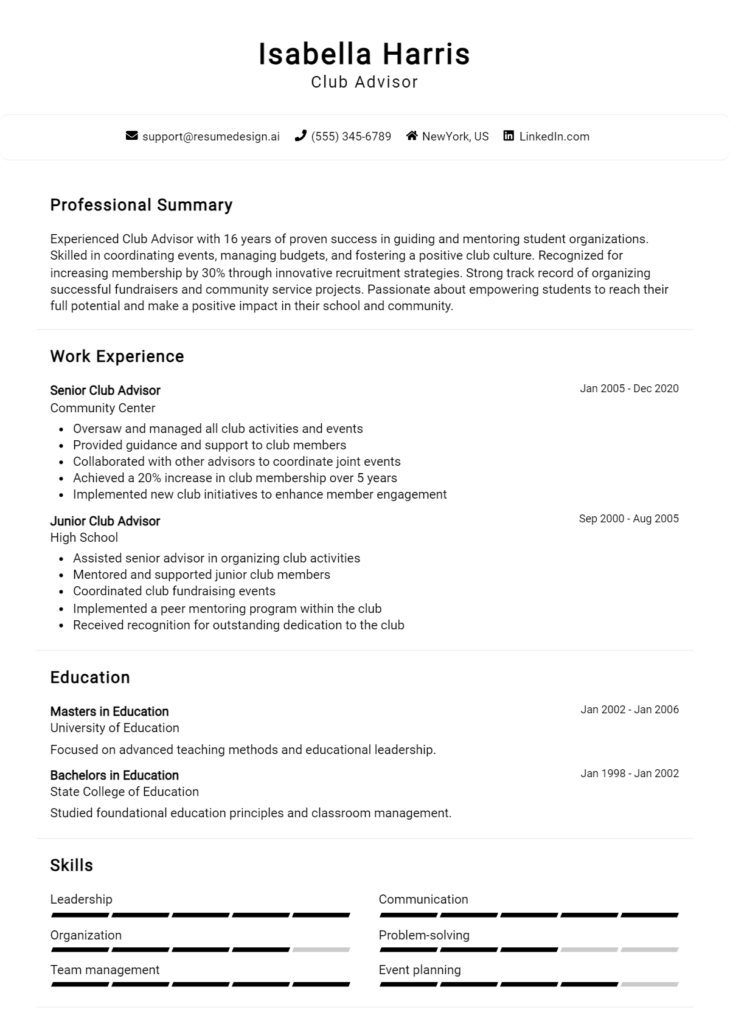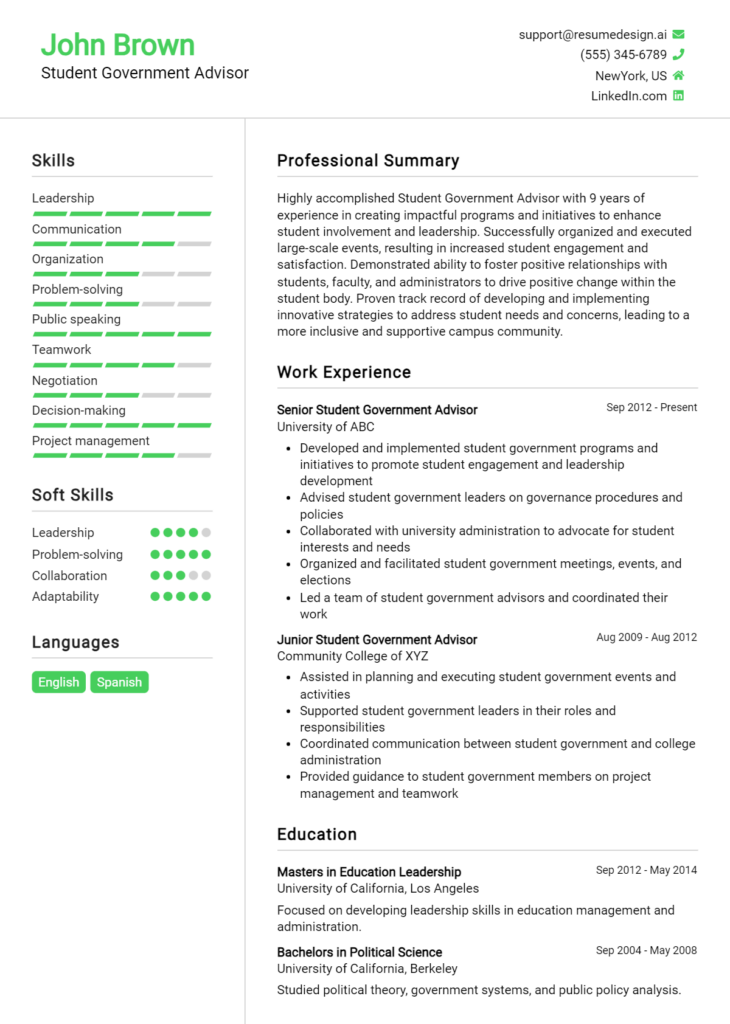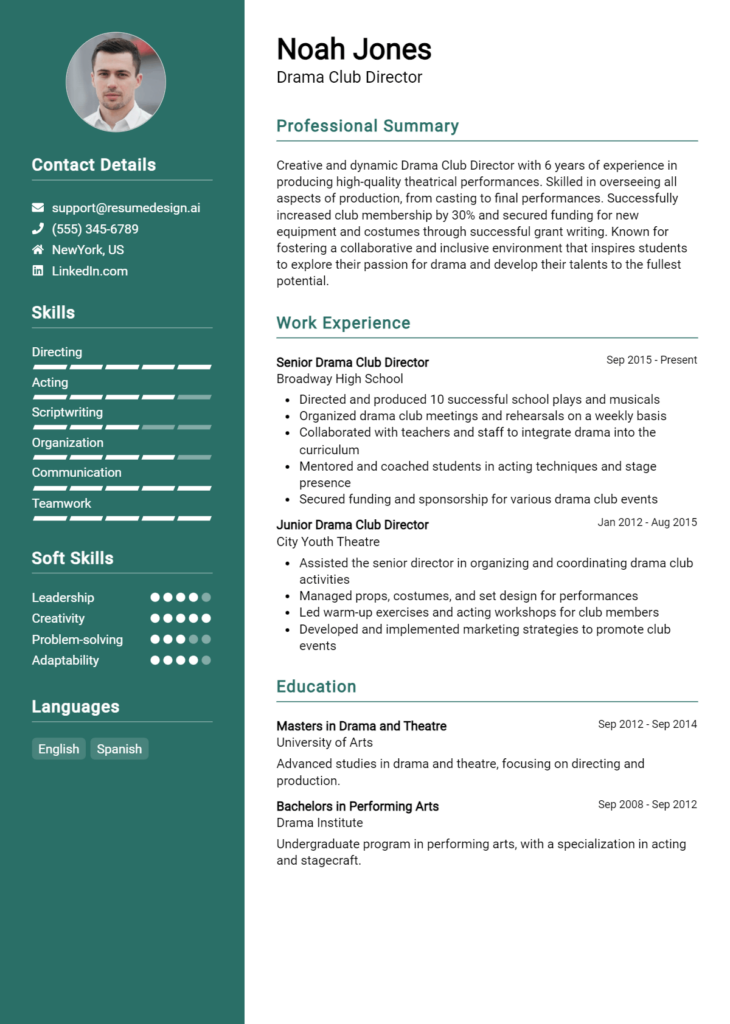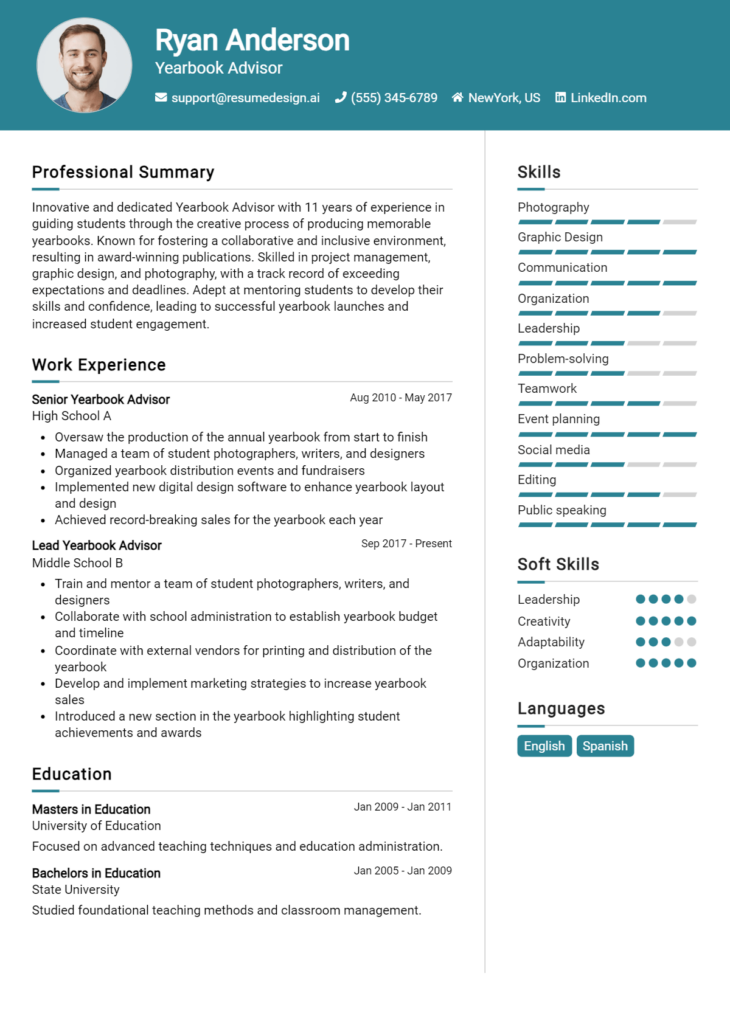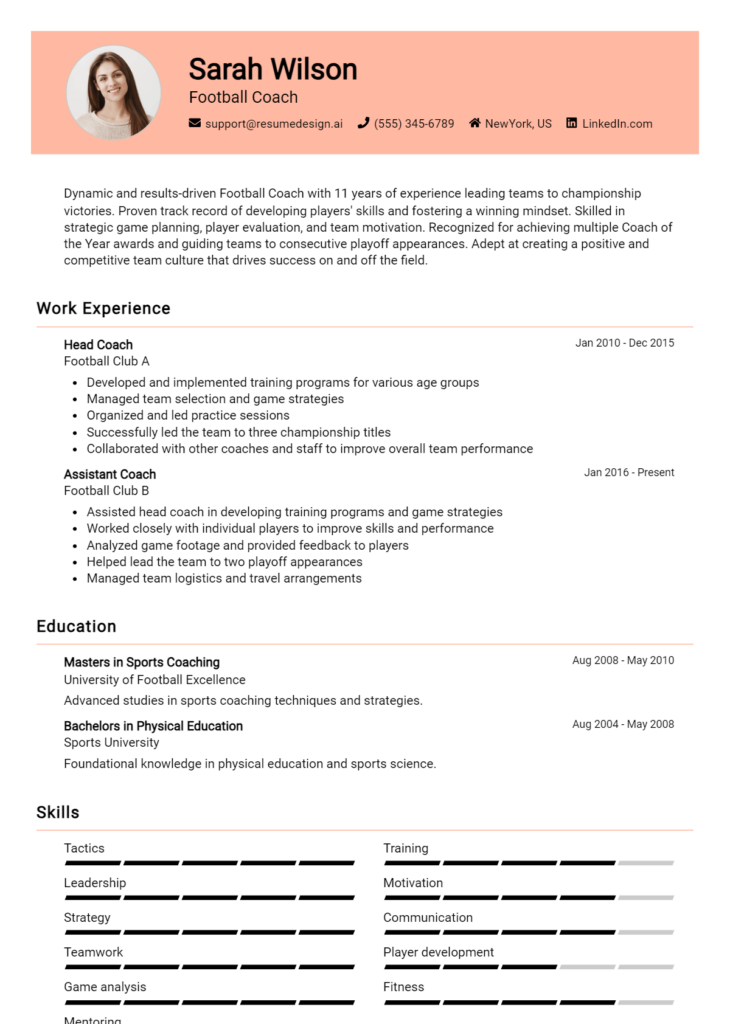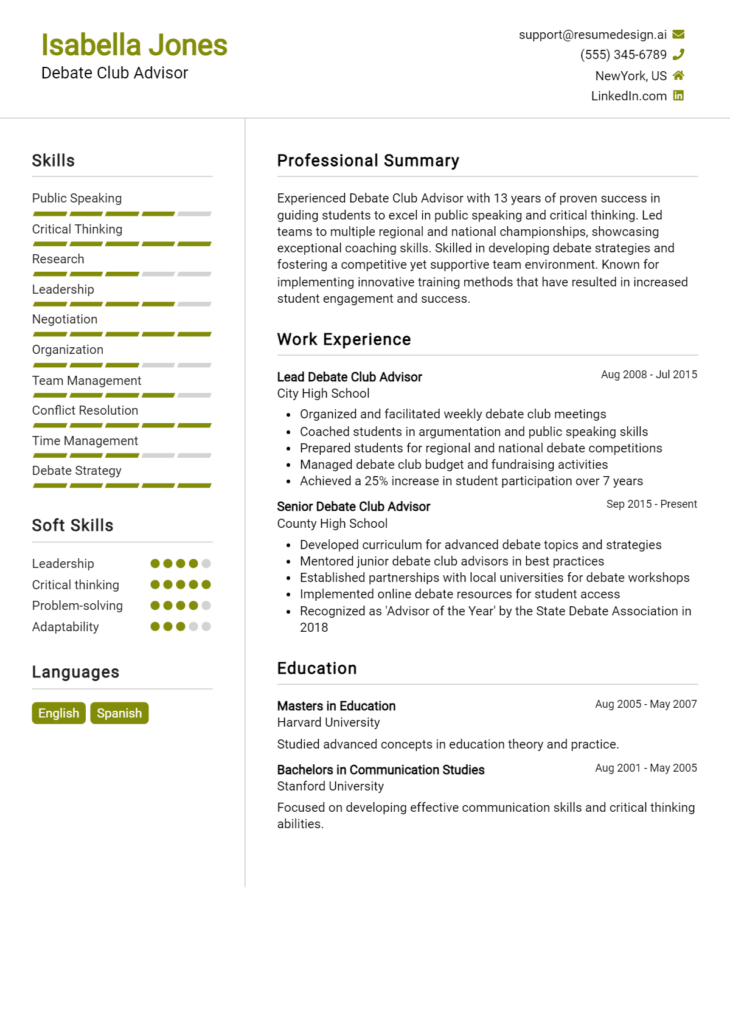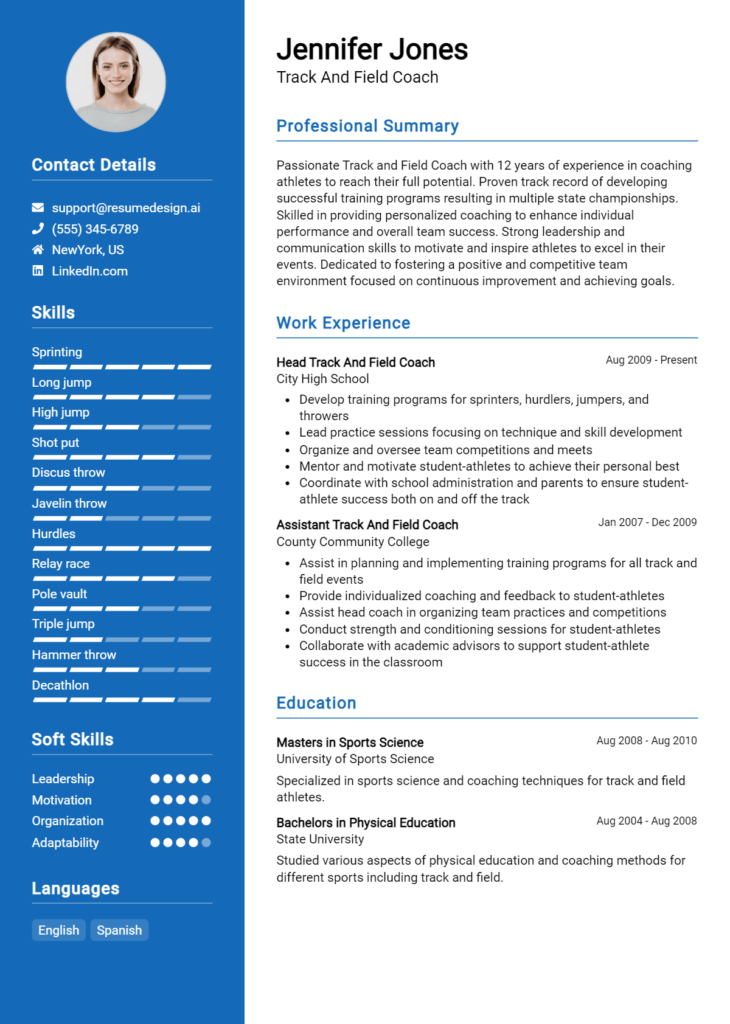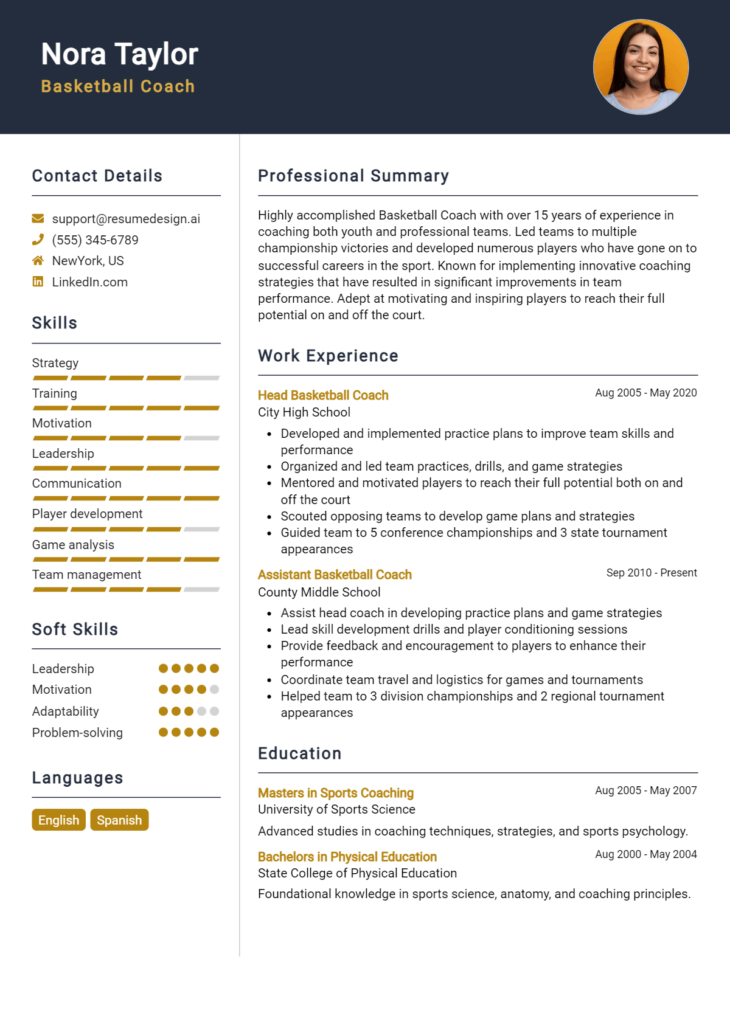Athletic Coach Core Responsibilities
An Athletic Coach plays a crucial role in developing athletes' skills, fostering teamwork, and ensuring fitness and performance levels are optimized. Key responsibilities include designing training programs, analyzing performance metrics, and providing strategic guidance during competitions. Essential skills encompass technical knowledge of sports, operational planning, and effective problem-solving capabilities. These competencies support collaboration across departments such as sports medicine, nutrition, and administration, ultimately aligning with the organization’s success. A well-crafted resume can effectively highlight these qualifications, showcasing a coach's impact on athlete development and organizational goals.
Common Responsibilities Listed on Athletic Coach Resume
- Develop and implement training programs tailored to individual athletes and teams
- Assess athlete performance and provide constructive feedback
- Coordinate practice schedules and competition logistics
- Monitor athlete health and fitness levels
- Foster a positive and motivating team environment
- Communicate effectively with athletes, parents, and staff
- Analyze game footage to improve strategies and techniques
- Collaborate with sports medicine professionals for injury prevention
- Organize and lead team meetings and workshops
- Stay updated on industry trends and coaching techniques
- Manage team budgets and resources
- Promote sportsmanship and ethical behavior among athletes
High-Level Resume Tips for Athletic Coach Professionals
In the competitive field of athletic coaching, a well-crafted resume is crucial for making a strong first impression on potential employers. Your resume serves as a reflection of your skills, achievements, and coaching philosophy, and it is often the first document that hiring managers will assess when considering candidates. A polished resume not only highlights your qualifications but also demonstrates your commitment to the profession. This guide will provide practical and actionable resume tips specifically tailored for athletic coach professionals, ensuring that your resume stands out in a crowded applicant pool.
Top Resume Tips for Athletic Coach Professionals
- Tailor your resume to match the specific job description by using keywords and phrases that align with the role.
- Showcase relevant coaching experience, including the teams you've coached, levels of play, and any specialized training or certifications.
- Quantify your achievements with specific metrics, such as win-loss records, athlete improvement statistics, or successful event outcomes.
- Highlight industry-specific skills, such as strategic planning, athlete development, and communication, that are essential for an effective coach.
- Include a summary statement at the top of your resume that captures your coaching philosophy and key qualifications in a few impactful sentences.
- List any additional roles or responsibilities, such as mentoring assistant coaches or leading community outreach programs, to demonstrate leadership capabilities.
- Incorporate professional development experiences, such as workshops, certifications, or conferences, to showcase your dedication to continuous improvement.
- Use a clean and organized format that enhances readability; avoid excessive jargon and keep language professional yet approachable.
- Include references or endorsements from former athletes, coaching staff, or athletic directors to add credibility to your application.
By implementing these resume tips, you can significantly increase your chances of landing a job in the athletic coaching field. A focused and well-structured resume will not only highlight your qualifications but also demonstrate your passion and commitment to fostering athletic excellence, making you a more appealing candidate to potential employers.
Why Resume Headlines & Titles are Important for Athletic Coach
In the competitive field of athletics, a resume serves as a first impression for potential employers, making it essential for candidates to stand out. This is where resume headlines and titles play a crucial role. A well-crafted headline or title can instantly grab the attention of hiring managers by summarizing a candidate's key qualifications in a compelling manner. It should be concise, relevant, and directly related to the job being applied for, allowing the candidate to showcase their unique strengths and set the tone for the rest of the resume.
Best Practices for Crafting Resume Headlines for Athletic Coach
- Keep it concise: Aim for a single, impactful phrase that captures your professional identity.
- Be role-specific: Tailor your headline to reflect the specific coaching position you’re applying for.
- Highlight key achievements: Include quantifiable accomplishments or skills that differentiate you from other candidates.
- Use active language: Employ strong action verbs to convey your proactive approach to coaching.
- Incorporate keywords: Utilize industry-relevant keywords to ensure your resume is optimized for applicant tracking systems.
- Avoid jargon: Maintain clarity and professionalism by avoiding overly technical language that may confuse readers.
- Show your passion: Reflect your enthusiasm for coaching and the sport in your headline.
- Revise and refine: Take time to revise your headline for maximum impact and clarity.
Example Resume Headlines for Athletic Coach
Strong Resume Headlines
Dynamic Athletic Coach with 10+ Years of Experience in Developing Winning Teams
Results-Driven Soccer Coach Specializing in Youth Development and Performance Enhancement
Certified Strength and Conditioning Specialist Committed to Athlete Health and Peak Performance
Weak Resume Headlines
Athletic Coach Seeking Opportunities
Experienced Individual in Coaching
Strong headlines are effective because they are specific, highlighting the candidate's unique skills and achievements while conveying a clear message about their professional identity. They engage hiring managers by providing a snapshot of what the candidate brings to the table. In contrast, weak headlines fail to impress due to their vagueness and lack of specificity, leaving employers with little motivation to delve deeper into the resume. A powerful headline can be the difference between a resume that gets noticed and one that is overlooked.
Writing an Exceptional Athletic Coach Resume Summary
A resume summary is a critical component for an Athletic Coach, as it serves as the first impression for hiring managers. A strong summary quickly captures attention by succinctly highlighting key skills, relevant experience, and notable accomplishments that align with the specific job role. Given the competitive nature of coaching positions, a well-crafted summary should be concise yet impactful, tailored to the job description, and reflect the candidate’s unique qualifications, ensuring it stands out among other applications.
Best Practices for Writing a Athletic Coach Resume Summary
- Quantify Achievements: Use numbers to showcase improvements in team performance, athlete development, or event outcomes.
- Focus on Relevant Skills: Highlight coaching techniques, communication skills, and leadership abilities that are directly applicable to the job.
- Tailor to Job Description: Customize the summary to reflect the specific requirements and responsibilities outlined in the job posting.
- Be Concise: Keep the summary to 3-5 sentences, ensuring every word adds value and relevance.
- Showcase Leadership Experience: Emphasize your role in mentoring athletes, managing teams, or developing training programs.
- Highlight Certifications: Mention any relevant coaching certifications, degrees, or special training that enhances your credentials.
- Incorporate Keywords: Use industry-specific terminology and keywords that align with the role to pass through applicant tracking systems.
- Reflect Passion: Convey your commitment to athlete development and your passion for coaching, as these traits can resonate with hiring managers.
Example Athletic Coach Resume Summaries
Strong Resume Summaries
Dynamic Athletic Coach with over 8 years of experience in leading high school soccer teams to state championships, achieving a 90% win rate. Skilled in developing tailored training programs that enhance athletes' performance, including a 25% improvement in team sprint times.
Results-oriented Coach with a proven track record of increasing player retention rates by 40% through innovative skill development workshops and mentorship programs. Certified in CPR and First Aid, with a strong focus on athlete health and safety.
Dedicated Athletic Coach specializing in youth development, recognized for fostering a positive team culture that resulted in a 50% increase in participation. Experienced in collaborating with parents and schools to promote athletic programs.
Weak Resume Summaries
Experienced coach looking for a new opportunity. I have worked with several teams and have good communication skills.
Athletic Coach with a background in sports. I enjoy helping athletes improve and reach their goals.
The examples of strong resume summaries are considered effective because they provide specific details and quantifiable achievements that demonstrate the candidate's impact and relevance to the coaching role. They include measurable results and tailored skills that align with the job description. In contrast, the weak resume summaries lack specificity and quantifiable outcomes, making them too generic and less compelling for potential employers.
Work Experience Section for Athletic Coach Resume
The work experience section of an Athletic Coach resume is vital as it serves as a comprehensive showcase of a candidate's technical skills, team management capabilities, and ability to deliver high-quality results in a competitive environment. This section highlights the candidate's hands-on experience, illustrating how they have effectively trained athletes, developed strategic game plans, and fostered team dynamics. By quantifying achievements, such as improved athlete performance metrics or successful team outcomes, and aligning these experiences with industry standards, candidates can present a compelling case for their qualifications and readiness to excel in the role.
Best Practices for Athletic Coach Work Experience
- Emphasize technical expertise by detailing specific training methodologies and coaching techniques used.
- Quantify achievements with metrics, such as win-loss records, athlete performance improvements, or awards received.
- Highlight collaborative experiences that demonstrate teamwork, such as working with other coaches or organizing joint training sessions.
- Use action verbs to describe responsibilities and accomplishments, creating a dynamic portrayal of your experience.
- Align descriptions with industry standards to showcase familiarity with current coaching practices and philosophies.
- Focus on leadership roles and responsibilities, illustrating your ability to guide and inspire athletes.
- Include relevant certifications or training that bolster your qualifications and expertise in the field.
- Tailor the work experience section to the specific job description, ensuring relevance to the prospective employer's needs.
Example Work Experiences for Athletic Coach
Strong Experiences
- Led a high school soccer team to a regional championship, increasing the team's win rate by 30% over two seasons.
- Implemented a new strength training program that improved athlete performance metrics by an average of 15% across all tested areas.
- Collaborated with fellow coaches and sports psychologists to develop a holistic training approach, resulting in a 20% decrease in athlete injuries.
- Trained and mentored junior coaches, enhancing their skills and contributing to a 50% increase in coaching staff certifications.
Weak Experiences
- Helped with team practices and sometimes organized drills.
- Coached a local team for a season without specific achievements.
- Attended coaching seminars and learned new techniques.
- Supported the athletic department in various tasks.
The examples labeled as strong experiences are effective because they provide specific, quantifiable outcomes that demonstrate the candidate's impact and leadership as an athletic coach. They highlight concrete achievements and collaborative efforts that align with industry standards, making the candidate more appealing to potential employers. In contrast, the weak experiences lack detail and measurable results, presenting vague statements that do not convey the candidate's skills or contributions effectively. This makes it challenging for hiring managers to assess the candidate's true capabilities and value in a coaching role.
Education and Certifications Section for Athletic Coach Resume
The education and certifications section of an Athletic Coach resume is crucial as it serves to highlight the candidate's academic background, industry-relevant certifications, and commitment to continuous learning. This section not only showcases the formal education that underpins a coach's expertise but also emphasizes specialized training and certifications that enhance their credibility. By providing relevant coursework and certifications, candidates can effectively illustrate their alignment with the job role and demonstrate their preparedness to meet the needs of athletes and teams.
Best Practices for Athletic Coach Education and Certifications
- Prioritize relevant degrees, such as Exercise Science, Sports Management, or Physical Education.
- Include certifications from recognized organizations, such as the National Federation of State High School Associations (NFHS) or the American College of Sports Medicine (ACSM).
- Detail any specialized training or workshops attended that relate to coaching techniques, sports psychology, or injury prevention.
- List certifications that require ongoing education to show commitment to professional development.
- Use specific titles for certifications to avoid ambiguity, such as "Certified Strength and Conditioning Specialist" (CSCS).
- Incorporate relevant coursework that showcases knowledge in areas like nutrition, athletic training, or sports ethics.
- Highlight any leadership roles or special projects completed during educational programs that demonstrate coaching capabilities.
- Keep the section concise and focused to maintain clarity and impact.
Example Education and Certifications for Athletic Coach
Strong Examples
- Bachelor of Science in Exercise Science, University of XYZ, Graduated May 2022
- Certified Strength and Conditioning Specialist (CSCS), National Strength and Conditioning Association, 2023
- Sports Coaching Certification, American Sports Education Program, 2022
- Advanced First Aid and CPR Certification, American Red Cross, Valid through 2024
Weak Examples
- Bachelor of Arts in History, University of ABC, Graduated May 2015
- Basic CPR Certification, Expired 2021
- Online Course in Business Management, 2019 (not relevant to coaching)
- Certification in Basic Sports Coaching, Unrecognized Organization, 2020
The examples provided are considered strong because they directly relate to the skills and knowledge required for effective coaching, showcasing relevant degrees, recognized certifications, and current training. In contrast, the weak examples highlight qualifications that are either outdated, irrelevant to the athletic coaching field, or lacking recognition, which diminishes the candidate's credibility and alignment with the coaching profession.
Top Skills & Keywords for Athletic Coach Resume
As an Athletic Coach, possessing a well-rounded skill set is crucial for crafting a compelling resume that stands out to potential employers. Skills not only showcase your expertise and qualifications but also demonstrate your ability to effectively lead and motivate athletes. In a competitive field like athletics, highlighting the right skills can make a significant difference in securing a coaching position. This includes a mix of hard and soft skills that reflect your technical knowledge, interpersonal abilities, and leadership qualities. To create a strong resume, it's essential to focus on these key skills, which will make your application more attractive to hiring managers.
Top Hard & Soft Skills for Athletic Coach
Soft Skills
- Communication
- Leadership
- Teamwork
- Motivation
- Adaptability
- Conflict Resolution
- Empathy
- Time Management
- Problem Solving
- Decision Making
- Mentoring
- Patience
- Creativity
- Positivity
Hard Skills
- Sport-specific knowledge
- Strength and conditioning
- Injury prevention and rehabilitation
- Performance analysis
- Nutrition planning
- Training program development
- Data analysis
- First aid and CPR certification
- Sports psychology
- Video analysis
- Compliance with athletic regulations
- Event planning and management
- Performance metrics tracking
- Equipment maintenance and management
- Familiarity with technology and coaching software
Integrating these skills into your resume, alongside your work experience, will enhance your profile and improve your chances of landing your desired position as an Athletic Coach.
Stand Out with a Winning Athletic Coach Cover Letter
Dear Hiring Committee,
I am excited to submit my application for the Athletic Coach position at [School/Organization Name]. With over [X years] of experience in coaching various sports and a deep passion for fostering athletic talent, I am eager to contribute my expertise to develop and inspire student-athletes. My background in sports science, combined with my hands-on coaching experience, equips me with the necessary skills to enhance performance and promote a culture of teamwork, resilience, and sportsmanship.
In my previous role at [Previous School/Organization Name], I successfully led the [specific sport] team to [specific achievement, e.g., a championship title, tournament appearance]. By implementing tailored training programs and focusing on individual athlete development, I was able to elevate the team's performance while ensuring that each athlete felt valued and motivated. My coaching philosophy emphasizes not only physical development but also mental toughness, leadership skills, and academic balance, which I believe are essential components of a successful athletic program.
I am particularly drawn to [School/Organization Name] because of your commitment to [specific values or mission of the organization, e.g., excellence in academics and athletics, community involvement, etc.]. I am eager to bring my innovative coaching techniques and enthusiasm for sports to your team, fostering an environment where athletes can thrive both on and off the field. I look forward to the opportunity to contribute to [specific program or initiative], and I am confident that my proactive approach and dedication will align with your goals.
Thank you for considering my application. I am keen to discuss how my experience and vision for coaching can contribute to the success of your athletic program. I look forward to the possibility of working together to inspire the next generation of student-athletes.
Sincerely,
[Your Name]
[Your Contact Information]
Common Mistakes to Avoid in a Athletic Coach Resume
An athletic coach resume is a critical tool for showcasing your qualifications and experience in the competitive sports industry. However, many candidates undermine their chances of landing their desired position by making common mistakes in their resumes. Avoiding these pitfalls can significantly enhance the effectiveness of your application and present you as a strong candidate. Here are several common mistakes to watch out for:
Generic Objective Statement: Using a one-size-fits-all objective statement can make your resume seem impersonal. Tailor your objective to reflect your specific goals and how they align with the position you are applying for.
Lack of Quantifiable Achievements: Failing to include measurable accomplishments can weaken your resume. Highlight specific outcomes, such as improvements in team performance or successful athlete development, to underscore your effectiveness.
Ignoring Relevant Experience: Omitting relevant coaching or athletic experience can lead to missed opportunities. Ensure you cover all applicable experiences, including volunteer positions, internships, or assistant coaching roles.
Poor Formatting and Organization: A cluttered or confusing layout can detract from your content. Use clear headings, bullet points, and consistent formatting to ensure your resume is easy to read and visually appealing.
Overemphasis on Responsibilities Rather than Skills: Focusing too much on job duties instead of the skills you developed can diminish your impact. Highlight key skills such as leadership, communication, and strategic planning that are essential for a successful coach.
Neglecting Continuing Education and Certifications: Failing to mention relevant certifications or coaching licenses may suggest a lack of commitment to professional development. Always include any current certifications and ongoing education that enhance your qualifications.
Using Jargon or Technical Language: Overloading your resume with industry-specific jargon can alienate hiring managers. Aim for clarity and simplicity, ensuring that your resume is accessible to a broad audience.
Not Tailoring Each Resume for Specific Job Applications: Sending the same resume for every application can hinder your chances. Customize your resume for each job by emphasizing the most relevant experiences and skills that match the job description.
Conclusion
As an athletic coach, your role is critical in shaping not only the skills of your athletes but also their mental resilience and sportsmanship. Throughout the article, we explored the essential qualities and skills that define an effective coach, including strong communication, leadership, and adaptability. We also discussed the importance of staying updated with the latest training techniques and fostering a positive team culture.
To ensure you stand out in this competitive field, it's crucial to have a well-crafted resume that highlights your coaching experience, relevant certifications, and your ability to motivate and develop athletes. Take the time to review your Athletic Coach Resume and ensure it reflects your unique strengths and achievements.
To assist you in this process, consider utilizing our comprehensive resources available at resume templates, resume builder, and resume examples. Additionally, don’t forget to check out our cover letter templates to complement your application materials. With these tools at your disposal, you’ll be well on your way to making a lasting impression in your coaching career.

